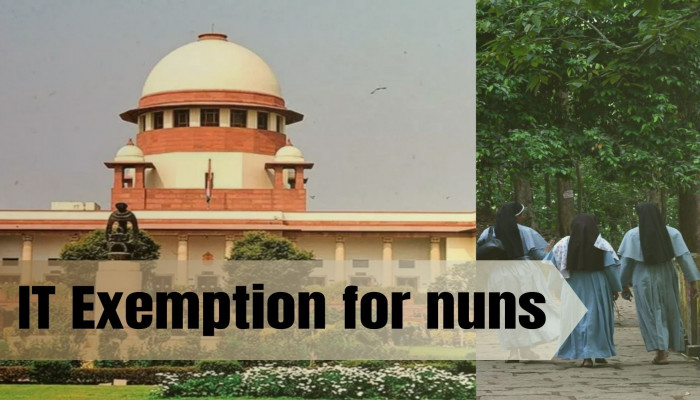SC upholds order on salaries of priests, nuns in aided schools subject to income tax
- In Reports
- 07:55 PM, Nov 08, 2024
- Myind Staff
On Thursday, the Supreme Court upheld a Madras High Court order stating that salaries paid to priests and nuns working as teachers in church-run, government-aided schools are subject to income tax. Initially, a single judge in the Madras High Court ruled that these salaries should not be taxed, as the income technically goes to the diocese rather than to the individuals themselves. The judge also noted that, under canon law, priests and nuns are considered to have experienced "civil death," meaning they should be exempt from Tax Deducted at Source (TDS). However, this decision was reversed by a High Court Division Bench in 2019, which was subsequently appealed to the Supreme Court.
On Thursday, a three-judge bench led by Chief Justice of India D.Y. Chandrachud ruled that salaries provided to priests and nuns in church-run, government-aided schools are not exempt from Tax Deducted at Source (TDS). Chief Justice Chandrachud explained, “The funds are allocated as salary grants to the school, and thus are considered salary payments to the priests or nuns, even if they don’t retain it personally.” He acknowledged that, as per their vow of poverty, they do not keep the salary, which is instead redirected by the organisation to sister institutions or charitable causes. However, TDS still applies to these payments.
Senior Advocate Arvind Datar, representing the appellants, argued that the funds do not go directly to the schools but are directed to the diocese, where they are taxed as a charitable trust. The bench also included Justices J.B. Pardiwala and Manoj Misra. But the bench did not agree. “How will the government pay the diocese? The government will never pay the diocese … .They can’t contribute to a religion… The government will pay to the school”. Datar said, “Though technically it will pay (to the school), the fund is to go straight to the diocese”.
“It’s not technically. The government says that this is our budget of, say Rs 5,000 crore for aided schools…to this particular school Rs 25 lakh is the grant in aid. The school will then say look, we will not distribute it to the teachers, but we will give it to the diocese. In the hands of the school, once it comes, it’s blocked to the salary for these teachers,” said the bench.
Datar said it’s not that way. “What happens is it never comes to the account of the school… I can bring the account and show you… What used to happen is because of a CBDT circular, because these priests don’t pay provident funds they don’t pay any kind of thing, the money goes to the diocese. The diocese is registered as a charitable trust under Section 11 of the Act. They have to disperse 75 per cent of whatever money they collect for charitable purposes. The priest gets nothing. For the last 85 years, the priests were never taxed.”
However, CJI Chandrachud said, “There may be a priest, say a Hindu priest who says that, well, I will not retain the salary. I will give this money which I receive, you know, for doing puja to an organisation. But if the person is employed, he gets the salary, tax has to be deducted. The law is common for everybody. How can you say that it’s not subject to TDS?”.
Datar pointed out that rulings from the Kerala and Madras High Courts have established that if a priest dies in an accident, any monetary compensation is directed to the diocese rather than to the priest’s family.
CJI Chandrachud said, “There is a reason for it because once you enter an ascetic order, that person has completely cut off all bound all bonds with the natural family… When that person dies, that family will have no claim for compensation because that person at the point of renouncing the family has cut of all bonds with the family, and they join the order. For instance, like a person who joins the Jain ascetic order.”
The senior counsel contended, “Rightly or wrongly, the Central Board of Direct Taxes has said I will not be taxed at salary. That circular has not been withdrawn. That circular still holds the field”.
He added that the definition of individual under the Income Tax Act will only include a person who is capable of receiving money. “I’m covered by the board circulars from 1940 onwards. These priests are not liable to income tax. They’re not liable to PF. They’re not liable for anything. They’re virtually like a civil death. They are just people. The definition of a person in the Income Tax Act includes an individual. Individuals can be taxed. individuals can be of different types. Suppose I have taken the triple vows, I am not capable of earning taxable income…”, Datar sought to reason.







Comments